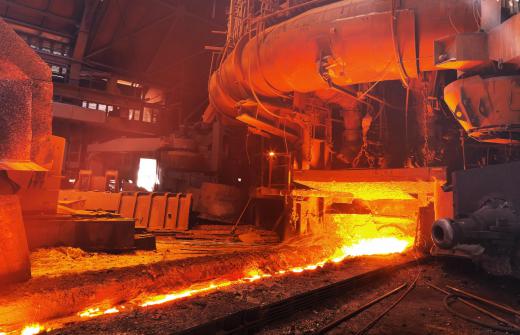A casting defect is a functional or aesthetic flaw in a piece of cast metal. There are a number of types of flaws people can observe in cast metal, and it is possible take steps to prevent flaws or address them once they arise. Using skilled personnel and appropriate equipment is an important step in making the casting process as successful as possible, as many flaws are the result of not handling materials properly during casting, and people can avoid them with proper training.
Sometimes, tiny bubbles form during casting, making the metal porous. This creates weak points that may fail under stress. Larger air pockets can also form and are sometimes not readily visible because they are inside the metal, rather than along the edges of the finished piece where people can easily see them. Metal may fail to fill a mold, creating a gap, or can overflow, making an overrun that someone will have to trim.

A casting defect can also involve differential cooling rates in the mold, creating lines where metal did not fully fuse. These are weak, and if the metal is under stress, it can bend or snap at those points. Contamination in the mold may also contribute to casting defects, leaving flecks of other materials in the finished product or creating a weak point by triggering chemical reactions that change the composition of the product while the metal is in a liquid state. People working with alloys can run into problems with poor mixtures or contamination, leading to bad performance in the mold and a subsequent casting defect.
Creating pieces of cast metal requires using appropriate molds, heating metals to the correct temperature, and handling the molds properly during the casting process. Many errors can lead to a casting defect. Sometimes, they are simply unpleasant to look at, and do not interfere with the function of the finished piece. Others may create a problem by weakening the metal. Casters use materials testing to check on the quality of products after they finish, looking for any defects that might make it necessary to discard the piece.
If it is possible to refinish or work the piece to fix the casting defect without compromising the integrity of the metal, a technician may consider this option. This must be weighed against the cost of tasking someone to fix the problem. Discards may be melted down and recycled, sold as seconds to people who do not need perfect pieces, or sold to recycling companies for another facility to use.
Ever since she began contributing to the site several years ago, Mary has embraced the exciting challenge of being a About Mechanics researcher and writer. Mary has a liberal arts degree from Goddard College and spends her free time reading, cooking, and exploring the great outdoors.

